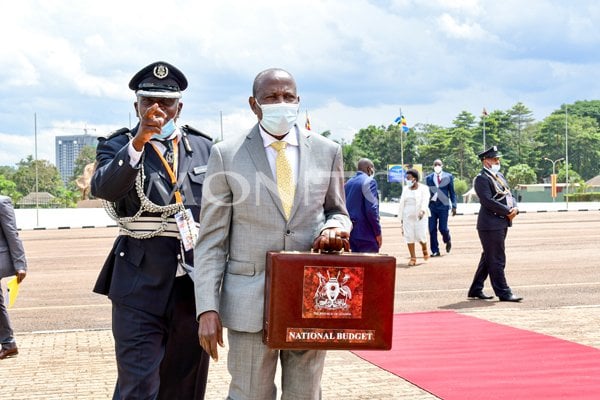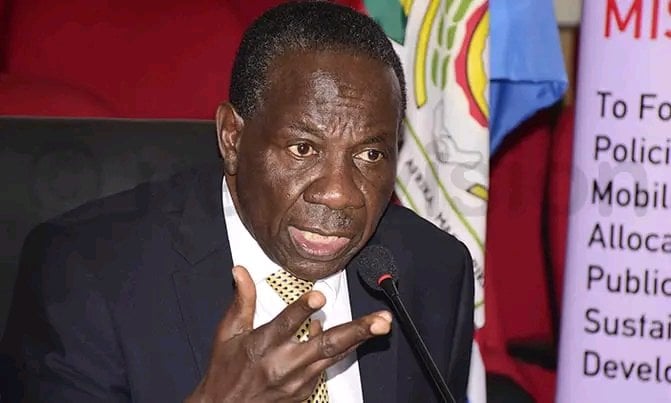Prime
Govt cuts public expenditure to tame rampant inflation

Minister of Finance Matia Kasaija arrives for the 2022/2023 National Budget reading at Kololo Independence Grounds on June 14, 2022. PHOTO / DAVID LUBOWA
Walking in the footsteps of the Central Bank, Finance Ministry officials have cut planned government spending for the Financial Year 2022/2023 in an attempt to tame rampant inflation and high interest rates.
Citing economic difficulties, the Ministry of Finance fiscal policymakers yesterday announced an unforeseen budget cut on public expenditure for the first quarter of the financial year 2022/2023 by six percent.
Public spending or government spending refers to money by the public sector for the acquisition of goods and provision of services such as education, healthcare, development projects, social protection, and defence, among others.
In the approved budget, the government public expenditure is supposed to be 25 percent representing Shs12 trillion in every quarter of the 2022/2023 national budget which is Shs48.1 trillion.
However, the Ministry of Finance, Planning and Economic Development said 25 percent of public expenditure has been reduced to 18.9 percent due to economic difficulties.
This development comes at a time when the global economic shocks have affected Uganda’s economy leading to rise in the prices of goods and services. Asked by the Permanent Secretary/Secretary to Treasury, Mr Ramathan Ggoobi, to respond to questions from journalists during the release of the first quarter budget for the Financial Year 2022/2023, the acting director of the budget, Mr Laban Mbulamuko, said initially the ministries had put their public expenditure at 33 percent in every quarter of the financial year but this was reduced to 25 percent in the approved budget.
“In the first quarter the public expenditure has been reduced to 18.9 percent in the first quarter of this financial year,” he said.
Mr Mbulamuko added that in the first quarter of this fiscal year, it would have been Shs7.76 trillion including debt but due to a reduction in public expenditure in the first quarter, the total release is Shs4.6 trillion less of debt (excluding debt).
“This development is for the first quarter release only,” he said.
While releasing the funds for the first quarter of the 2022/2023 financial year national budget, Mr Ggoobi, said the expenditure limits for quarter one of Financial Year 2022/2023 were derived based on the work plans and procurement plans of Ministries, Departments and Agencies (MDAs) and the available resources for quarter one of Financial Year 2022/2023.
“The quarter one release has been constrained by the state of the economy, especially; the effort of the government to coordinate its fiscal policy with monetary policy to arrest the inflation. We to ensure that the demand matches with supply in the economy,” he said.
Mr Ggoobi added: “We have not made a release for capital expenditure as it will be prioritised in quarter two with exception wage for contract staff salaries, Ministry of Defence, State House and Ministry of Works (Shs26b).”
Unlike in the past years, which were characterised by the rampant emergence of supplementary budgets forcing the government to borrow externally or eternally by issuing treasury bills and treasury bonds to raise funds for the supplementary budgets, Mr Ggoobi said there are no more supplementary budgets in this financial year.
“All government operations this financial year will underpin fiscal discipline, budget credibility, commitment to service delivery and timely project execution. The ministry will not entertain supplementary budget expenditures that are not for security or industrial policy purposes, themselves accommodated within the three percent of the appropriated budget,” he said.
The implication of the government’s decision to reduce the public expenditure in the first quarter of this fiscal year is that there is going to be less money circulating in the economy as the government and the central bank tries to control the rising inflation which adversely affects the poor and it also affects investment in the country.
Mr Ggoobi said the move to reduce public expenditure in the first quarter is meant to protect the poor people who are more affected by the rise in commodity prices and global economic shocks. However, he said the cost of living is high due to the impact of global economic shocks in Uganda is temporary and will end in the medium term.
The headline inflation rate increased to 6.8 percent in June, up from 6.3 percent registered in May. This was mainly driven by the increase in the prices of commodities.
Core inflation, which the Central Bank used to control inflation at five percent, increased to 5.5 percent in the year ended June, up from 5.1 percent registered in the year ended May.
Mr Ggoobi said with expenditure cuts there is going to be less money in the economy and there is going to be less spending on fuel, people are going to be more economical.
Guarding against any unplanned recurrent public spending, Mr Ggoobi said: “No recruitment should be done without clearance from the Ministry of Public Service after asserting availability of adequate wage from this ministry.”
Out of Shs4.6 trillion that has been released, he said security agencies have been provided with Shs721b, Shs47.6b has been provided for the Judiciary, and Shs175b to Parliament.
Reaction
Reacting to the release of the funds for quarter one, the executive director of the Civil Society Budget Advocacy Group (CSBAG), Mr Julius Mukunda, said there was no mention of the Parish Development Model (PDM) and they welcome it because their research shows that the parish is not ready and allocating money or sending money to the parishes would be a waste of money.
“We have also discovered that the parishes do not have a development committee to track progress in the parish. So you can not release the money if you don’t know where it is going,” he said.
Mr Mukunda also tasked the Ministry of Finance, to provide the status of the Small Business Recovery Fund that the government has established.
The executive director of Advocates Coalition for Development and Environment (ACODE), Dr Arthur Bainomugisha, said by sanctioning the accounting officers by the treasury is good because people must deliver but there should be a reward for those who are performing better.
However, he said there no coordination between the central government and the Local Government.
“Another challenge is the increasing cost of living and most people are likely to slip into poverty. We also have the problem of climate change and global warming is on the rise. Mitigating climate change and adaptation are needed,”he said.




